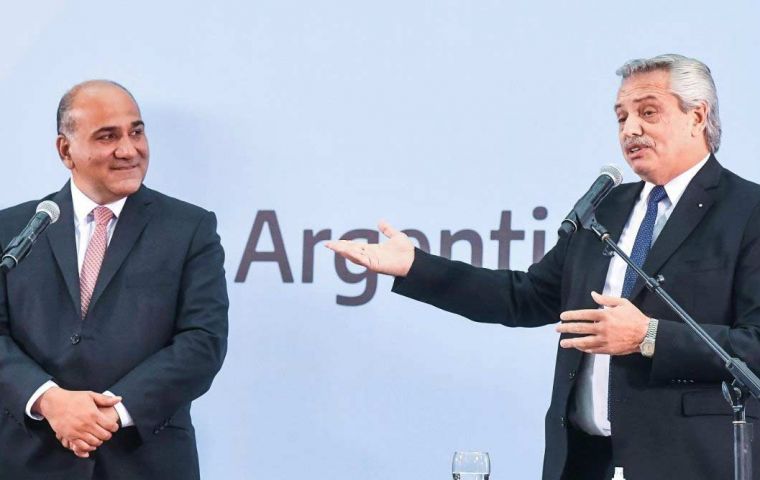MercoPress. South Atlantic News Agency
Federal forces to be deployed in violence-riddled Argentine city of Rosario
 The newly-appointed Manzur and Aníbal Fernández allow President Alberto Fernández to stay in the background and pay the political price for the government's electoral defeat
The newly-appointed Manzur and Aníbal Fernández allow President Alberto Fernández to stay in the background and pay the political price for the government's electoral defeat The Argentine Government Tuesday announced the sending of a 1.575-strong federal security team to the Rosario area in the province of Santa Fe within the next two to three weeks, as drug violence and crime are increasingly on the rise since the beginning of the COVID-19 pandemic.
Following this initial step, a second Gendarmería Nacional (Border Guard) squad consisting of some 1,000 operatives is to arrive by March 2022.
The announcement was made by Cabinet Chief Juan Manzur, flanked by Security Minister Aníbal Fernández and Interior Minister Eduardo “Wado” De Pedro, together with Santa Fe Governor Omar Perotti, after a meeting at Casa Rosada.
“We are going to deploy that amount of troops from the national federal forces and then we will complete it with the sending of more personnel to form a unit that will be deployed in the province with the purpose of reinforcing security in the province of Santa Fe,” Minister Fernández explained.
Meanhile, Perotti highlighted the administration of President Alberto Fernández to create a new mobile unit. “It is a concrete sign of a decision by the national government,” in line with promises made by President Fernández “when he visited Santa Fe.”
Manzur explained ”the President's instruction is to double down on efforts to reinforce security in the province.“
”We work from the government and the Ministries of Security and Interior to accompany the people of the province at this time,” Manzur added.
The Government's electoral defeat at the Open, Simultaneous and Mandatory Primary (PASO) elections earlier this month has resuilted in a cabinet reshuffle and in concrete actions such as this one regarding Rosario violence.
Other measures coming up include the lifting of the cap on meat exports and the reopening of all economic activities by easing down on sanitary restrictions.
President Fernández has vowed to look into the things that were done well and the things that were not in his first year and a half at the helm of the nation.
Hence this attempt to try to stop the crime wave that is sweeping entire neighborhoods under the wing of drug trafficking in Rosario.
Minister Fernández also pointed out that “unlike his predecessor, Sabina Frederic, who compared Rosario or the Buenos Aires suburbs with Switzerland,” the Governmanet was now taking care of the problem.
These new measures, announced barely 50 days before the Nov. 14 mid-term elections, are a clear political maneuver by the ruling Frente de Todos (FdT) to reverse a negative political scenario.
According to Casa Rosada sources quoted by news outlets in the Argentine capital, the federal Government is planning similar steps in the outskirts of the Autonomous City of Buenos Aires, where violence is also taking its toll on ordinary citizens.
Perotti's pleas, as well as those from Justicialkist mayors in the Province of Buenos Aires seems to have finally been heard.
The appointment of Aníbal Fernández was also aimed at solving political differences between Frederic and Buenos Aires' provincial Security Minister Sergio Berni, analysts explained.
Measures like these also position Manzur as the Government's new visible face, while allowing for a retreat by President Fernández from public appearances, since it is him the one die-hard Kirchnerites blame for the recent electoral results.
Aníbal Fernández admitted the Rosario issue could no longer be regarded as a problem affecting only one city, “because it is a problem that concerns all Argentines.”




Top Comments
Disclaimer & comment rulesCommenting for this story is now closed.
If you have a Facebook account, become a fan and comment on our Facebook Page!